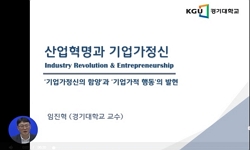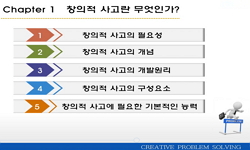The purpose of this study is to promote the activation of creative problem - solving education in Korea through the case of countries leading education for creative problem solving in order to overcome the limitation of creative problem solving educat...
http://chineseinput.net/에서 pinyin(병음)방식으로 중국어를 변환할 수 있습니다.
변환된 중국어를 복사하여 사용하시면 됩니다.
- 中文 을 입력하시려면 zhongwen을 입력하시고 space를누르시면됩니다.
- 北京 을 입력하시려면 beijing을 입력하시고 space를 누르시면 됩니다.

대학 창업교육의 고도화를 위한 창의적 문제해결역량교육에 대한 고찰: 해외의 교육정책 및 사례분석의 시사점 = Entrepreneurship Education of Higher Educational Institutions: Lessons and Implications From Leading Countries’ Educational Policies and Cases
한글로보기https://www.riss.kr/link?id=A103663225
- 저자
- 발행기관
- 학술지명
- 권호사항
-
발행연도
2017
-
작성언어
Korean
- 주제어
-
등재정보
KCI등재
-
자료형태
학술저널
-
수록면
65-76(12쪽)
-
KCI 피인용횟수
7
- DOI식별코드
- 제공처
-
0
상세조회 -
0
다운로드
부가정보
다국어 초록 (Multilingual Abstract)
Based on 5 success factors by our cases of United States, Singapore, and Dublin City University in Ireland, we focused on the cases and extracted five key characteristics of creative problem solving education. The university should be able to provide various information gathering and theoretical knowledge for problem definition as well as continuing guidance and mentoring, rather than one-time teaching, in the form of teaching-student cooperative learning paradigm. Second, the class should be a team - based learning team which is a key factor in overseas universities' policy, so as to be able to identify differentiated, new ideas and creative problem solving methods based on knowledge and experience sharing. The creative problem solving method derived from education could be able to collect, organize, and apply to the field continuously and comprehensively about the learning process of the individual. Evaluation of curriculum should be based on characteristics of school and characteristics of students. The results of creative problem-solving education should be evaluated in order to continuously develop and create value in addition to the outcomes of the class. Therefore, it is necessary to develop an evaluation process for each university. The university should try to make creative problem solving education create value through specialization of university. Based on this, we propose a creative problem solving education framework.
The purpose of this study is to promote the activation of creative problem - solving education in Korea through the case of countries leading education for creative problem solving in order to overcome the limitation of creative problem solving education in Korea.
Based on 5 success factors by our cases of United States, Singapore, and Dublin City University in Ireland, we focused on the cases and extracted five key characteristics of creative problem solving education. The university should be able to provide various information gathering and theoretical knowledge for problem definition as well as continuing guidance and mentoring, rather than one-time teaching, in the form of teaching-student cooperative learning paradigm. Second, the class should be a team - based learning team which is a key factor in overseas universities' policy, so as to be able to identify differentiated, new ideas and creative problem solving methods based on knowledge and experience sharing. The creative problem solving method derived from education could be able to collect, organize, and apply to the field continuously and comprehensively about the learning process of the individual. Evaluation of curriculum should be based on characteristics of school and characteristics of students. The results of creative problem-solving education should be evaluated in order to continuously develop and create value in addition to the outcomes of the class. Therefore, it is necessary to develop an evaluation process for each university. The university should try to make creative problem solving education create value through specialization of university. Based on this, we propose a creative problem solving education framework.
국문 초록 (Abstract)
본 연구의 목적은 창업교육에 있어 중요한 창의적 문제해결역량에 관한 연구를 살펴보고, 해외의 창의적 문제해결역량교육 관련 정책과 우수 대학의 교과과정 사례를 분석하여 국내의 창의...
본 연구의 목적은 창업교육에 있어 중요한 창의적 문제해결역량에 관한 연구를 살펴보고, 해외의 창의적 문제해결역량교육 관련 정책과 우수 대학의 교과과정 사례를 분석하여 국내의 창의적 문제해결역량교육의 문제점을 극복하기 위한 교육의 프레임워크 및 대학의 역할에 대하여 시사점을 제시하고자 하는 것이다. 이에 문제해결 역량에 관한 기존 연구들과 해외 국가 및 대학의 문제해결 교육 정책 및 교육과정 사례를 중심으로 창의적 문제해결역량교육을 위한 프레임워크를 제시하였다. 본 연구에서 제시한 창의적 문제해결역량교육 프레임워크는 크게 문제정의, 문제해결방법, 결과적용의 체계로 다음과 같은 구성을 포함한다. 첫째, 창의적 문제해결 교육의 첫 번째 단계인 이론기반 교육과 지속적인 지도와 멘토링의 구성이다. 둘째, 해외대학에서 교육의 주요 정책으로 내세우는 팀기반 학습법이다. 셋째, 체계적인 교육과정평가 개발이다. 넷째, 현장 연계형 및 융합형 패러다임의 구축이다. 이러한 프레임워크를 통해 국내 창의적 문제해결역량교육의 시사점을 국가, 대학, 교과과정 설계차원으로 제시하고, 창업교육과의 상호관계 및 융합의 중요성을 제시한다.
참고문헌 (Reference)
1 박민정, "프로젝트 기반 수업을 통한 대학원 학생들의 학습경험에 관한 연구" 한국교육과정학회 25 (25): 265-288, 2007
2 최명길, "청년층의 창업교육이 창업의지에 미치는 영향에 대한 연구 : 문화, 관광 창업 교육을 수강한 대학생을 중심으로" (사)한국관광레저학회 24 (24): 201-220, 2012
3 이병민, "창의적 대학의 역할을 통한 지역발전의 특징 연구" 국토지리학회 47 (47): 201-216, 2013
4 이경화, "창의·인성교육이 초중등 학생들의 창의성과 자아개념 향상에 미치는 효과" 한국창의력교육학회 14 (14): 1-16, 2014
5 박상혁, "창업대학원과 대학생을 연계한 창업컨설팅 사례연구: 액션러닝을 활용한 창업교육 및 컨설팅 프로그램" 한국벤처창업학회 9 (9): 25-32, 2014
6 김연정, "창업교육이 셀프리더십과 기업가정신에 미치는 영향에 관한 연구" 한국디지털정책학회 10 (10): 23-31, 2012
7 최종인, "창업교육을 위한 프로그램 개발과제" 한국벤처창업학회 7 (7): 125-134, 2012
8 김병찬, "일본과 한국의 창의성 교육정책 비교 분석 연구" 교육문제연구소 28 (28): 105-141, 2015
9 윤수정, "웹기반 사례중심학습환경에서 사례제시방식, 메타인지가 개념이해, 문제해결에 주는 효과" 한국교육방법학회 18 (18): 201-219, 2006
10 백윤수, "우리나라 STEAM 교육의 방향" 학습자중심교과교육학회 11 (11): 149-171, 2011
1 박민정, "프로젝트 기반 수업을 통한 대학원 학생들의 학습경험에 관한 연구" 한국교육과정학회 25 (25): 265-288, 2007
2 최명길, "청년층의 창업교육이 창업의지에 미치는 영향에 대한 연구 : 문화, 관광 창업 교육을 수강한 대학생을 중심으로" (사)한국관광레저학회 24 (24): 201-220, 2012
3 이병민, "창의적 대학의 역할을 통한 지역발전의 특징 연구" 국토지리학회 47 (47): 201-216, 2013
4 이경화, "창의·인성교육이 초중등 학생들의 창의성과 자아개념 향상에 미치는 효과" 한국창의력교육학회 14 (14): 1-16, 2014
5 박상혁, "창업대학원과 대학생을 연계한 창업컨설팅 사례연구: 액션러닝을 활용한 창업교육 및 컨설팅 프로그램" 한국벤처창업학회 9 (9): 25-32, 2014
6 김연정, "창업교육이 셀프리더십과 기업가정신에 미치는 영향에 관한 연구" 한국디지털정책학회 10 (10): 23-31, 2012
7 최종인, "창업교육을 위한 프로그램 개발과제" 한국벤처창업학회 7 (7): 125-134, 2012
8 김병찬, "일본과 한국의 창의성 교육정책 비교 분석 연구" 교육문제연구소 28 (28): 105-141, 2015
9 윤수정, "웹기반 사례중심학습환경에서 사례제시방식, 메타인지가 개념이해, 문제해결에 주는 효과" 한국교육방법학회 18 (18): 201-219, 2006
10 백윤수, "우리나라 STEAM 교육의 방향" 학습자중심교과교육학회 11 (11): 149-171, 2011
11 정도범, "아이디어 지원 플랫폼의 현황에 관한 연구: 창조경제타운의 확산을 중심으로" 사단법인 인문사회과학기술융합학회 5 (5): 37-44, 2015
12 김미영, "문제중심학습 설계 및 운영 사례연구: 국제기업문화의 이해 교과목을 중심으로" 한국상업교육학회 28 (28): 1-23, 2014
13 이지선, "디자인 사고를 바탕으로 한 개방형 협업 창의발상 시스템 연구" 한국디지털디자인학회 12 (12): 179-190, 2012
14 김자인, "디스쿨(d.School)의 디자인사고 교육" 한국디지털디자인학회 15 (15): 97-108, 2015
15 최정임, "대학수업에서의 문제중심학습 적용 사례연구:성찰일기를 통한 효과성 분석을 중심으로" 한국교육공학회 23 (23): 35-65, 2007
16 이미나, "대학생의 창의성 교육에 대한 전공계열별 인식 비교" 한국교육과정학회 30 (30): 353-376, 2012
17 최종인, "대학 창업교육 핵심 성공요인: 미국 대학 사례의 시사점" 한국벤처창업학회 8 (8): 85-96, 2013
18 김동일, "대학 교수가 바라본 고등교육에서의 대학생 핵심역량: 서울대학교 사례를 중심으로" 교육연구소 10 (10): 195-214, 2009
19 박인숙, "과학 창의적 문제 해결 능력에 대한 현장 교사들의 인식" 한국과학교육학회 31 (31): 314-327, 2011
20 박경선, "공학교육에서의 팀티칭기반 융합프로젝트중심 교수학습모형의 개발" 한국공학교육학회 17 (17): 11-24, 2014
21 방민석, "‘정부3.0’에 대한 개념적 탐색과 법정책적 과제" 한국지역정보화학회 16 (16): 123-146, 2013
22 Lee, I. H., "University Fusion Culture Course for the Development of Creativity
23 Embretson, S. E., "Understanding and quantifying cognitive complexity level in mathematical problem solving items" 50 (50): 328-, 2008
24 Jonassen, D. H., "Toward a design theory of problem solving" 48 (48): 63-85, 2000
25 Mayer, R. E., "Thinking, problem solving, cognition" WH Freeman/Times Books/Henry Holt &Co 1992
26 York, J. G., "The entrepreneur–environment nexus : Uncertainty, innovation, and allocation" 25 (25): 449-463, 2010
27 Young English Education Center in Australia, "The Sydney University"
28 OECD, "The OECD’s Contribution on Education to the Post-2015 Framework: PISA for development, OECD and Post-2015 Reflections series"
29 CISCO, "The Learning Society"
30 Rue, S. W., "Report on the Actual Situation Analysis of Creative, Auditor Researcher" Audit and Inspection Research Institute 2012
31 Dublin City University, "Problem solving"
32 Singapore Insititute of Management, "Problem solving"
33 The University of Sydney, "Problem solving"
34 Shane, S., "Prior knowledge and the discovery of entrepreneurial opportunities" 11 (11): 448-469, 2000
35 Timmons, J. A., "New Venture Creation" Irwin 1994
36 Gordon, S., "Making sense of the inclusion debate under IDEA" BYU Educ. & LJ 189-, 2006
37 Choi, S. D., "Future Strategies for Educating Creative Talents in the 21st Century" Korea Educational Development Institute 2011
38 Lee, E. S., "Future Strategies for Cultivating Creative Talent in Higher Education" Korea Educational Development Institute 2011
39 Jung, Y. C., "Fourth industry education should focus on morality, cooperation, problem solving ability, and curiosity, Brain media"
40 Embassy of Australia in Korea, "Exploring Creative Art at Sydney University"
41 Kolb, D. A., "Experiential learning: Experience as the source of learning and development" FT press 2014
42 Singh, R. P., "Entrepreneurial opportunity recognition through social networks" 1998
43 Davidsson, P., "Entrepreneurial opportunities and the entrepreneurship nexus : A re-conceptualization" 30 (30): 674-695, 2015
44 Kang, H. J., "Engineering education for creativity, Innovative Learning Environments for Authentic Education" 2014
45 Yang, S. Y., "Education system, which is the source of competitiveness in Singapore" 145 : 4-7, 2005
46 Fasko, D., "Education and creativity" 13 (13): 317-327, 2001
47 Koehler, M. J., "Designing case-based hypermedia for developing understanding of children's mathematical reasoning" 20 (20): 151-195, 2002
48 Han, K. S., "Current Status and Tasks of University Creativity Education" Sungkyunkwan University Dasan creative center 16-28, 2012
49 Korea Education Development Institute, "Creative education"
50 Isaksen, S. G., "Creative approaches to problem solving: A framework for change" Kendall Hunt Publishing Company 2000
51 Kim, K. J., "Conceptualization of creative problem solving for the development of curriculum for school subjects" 15 (15): 129-153, 1997
52 Rue, S. Y., "Colin Bailey Vice President of the University of Manchester, UK "Creativity can not be taught""
53 Isaksen, S. G., "Celebrating 50 years of reflective practice : Versions of creative problem solving" 38 : 75-101, 2004
54 Kim, Y. S., "4th Industrial Revolution and Educational innovation"
동일학술지(권/호) 다른 논문
-
외식창업부동산점포의 입지요인이 경영성과에 미치는 영향: 창업만족도의 매개효과
- 한국벤처창업학회
- 이무선
- 2017
- KCI등재
-
- 한국벤처창업학회
- 최석웅
- 2017
- KCI등재
-
지역특화 전략에 기반한 산학협력에 관한 연구: 충청권 연구마을 특성화 연계 전략을 중심으로
- 한국벤처창업학회
- 홍은영
- 2017
- KCI등재
-
지역 금융기관 상품 및 서비스품질 요인이 고객 만족과 고객 충성도에 미치는 영향
- 한국벤처창업학회
- 천영애
- 2017
- KCI등재
분석정보
인용정보 인용지수 설명보기
학술지 이력
| 연월일 | 이력구분 | 이력상세 | 등재구분 |
|---|---|---|---|
| 2026 | 평가예정 | 재인증평가 신청대상 (재인증) | |
| 2020-01-01 | 평가 | 등재학술지 유지 (재인증) |  |
| 2017-01-01 | 평가 | 등재학술지 유지 (계속평가) |  |
| 2013-01-01 | 평가 | 등재학술지 선정 (등재후보2차) |  |
| 2012-01-01 | 평가 | 등재후보 1차 PASS (등재후보1차) |  |
| 2010-01-01 | 평가 | 등재후보학술지 선정 (신규평가) |  |
학술지 인용정보
| 기준연도 | WOS-KCI 통합IF(2년) | KCIF(2년) | KCIF(3년) |
|---|---|---|---|
| 2016 | 1.21 | 1.21 | 1.16 |
| KCIF(4년) | KCIF(5년) | 중심성지수(3년) | 즉시성지수 |
| 1.15 | 1.12 | 1.187 | 0.36 |




 ScienceON
ScienceON






